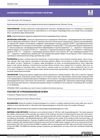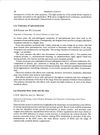 2 citations,
December 2021 in “Cureus”
2 citations,
December 2021 in “Cureus” Most women with Polycystic Ovary Syndrome (PCOS) have skin issues like excessive hair, acne, or hair loss. Hormone imbalances are common, and age, certain hormones, and hormone ratios can predict acne. Obesity, infertility, and high cholesterol are also common in these women.
 2 citations,
July 2021 in “Annales De Dermatologie Et De Venereologie”
2 citations,
July 2021 in “Annales De Dermatologie Et De Venereologie” Vulvar acne, also known as "vulvar Fordyce adenitis", is a condition causing painful bumps on the labia, and it's not always effectively treated with common acne medications, but isotretinoin has shown promise.
[object Object]  2 citations,
April 2021 in “Reproductive health of woman”
2 citations,
April 2021 in “Reproductive health of woman” Most women with polycystic ovary syndrome (PCOS) have menstrual issues, infertility, acne, and excessive body hair, with the most common type being the non-androgenic phenotype.
 2 citations,
May 2020 in “Konuralp Tip Dergisi”
2 citations,
May 2020 in “Konuralp Tip Dergisi” Some dermatology patients use traditional and complementary medicine, often for acne, and many recommend it, but they need more information about its effects.
 2 citations,
May 1999 in “PubMed”
2 citations,
May 1999 in “PubMed” Hyperandrogenism in women can cause acne, hair growth, hair loss, irregular periods, and increase the risk of infertility and diabetes.
 2 citations,
August 1987 in “Australasian Journal of Dermatology”
2 citations,
August 1987 in “Australasian Journal of Dermatology” Birth control pills can cause skin issues but may help with acne and hirsutism, and choosing the right type can minimize side effects.
 1 citations,
June 2023 in “Cureus”
1 citations,
June 2023 in “Cureus” Many women with seborrheic dermatitis also have acne and diabetes, and should be checked for these conditions to help improve their quality of life.
 1 citations,
December 2022 in “Gynecological Endocrinology”
1 citations,
December 2022 in “Gynecological Endocrinology” The most common skin issues in females with Polycystic Ovary Syndrome (PCOS) are excessive hair growth, hair loss, oily skin, acne, dark skin patches, and skin tags, which may be linked to hormone and insulin levels.
 1 citations,
October 2022 in “Adolescent Health, Medicine and Therapeutics”
1 citations,
October 2022 in “Adolescent Health, Medicine and Therapeutics” Gender-affirming therapy can cause skin issues like acne and hair loss in transgender adolescents, and more research is needed on its dermatological effects.
 1 citations,
January 2022 in “Transgender health”
1 citations,
January 2022 in “Transgender health” Hormone therapy in transgender individuals can increase acne and affect hair growth and loss.
 1 citations,
January 2022 in “Turkiye Klinikleri Journal of Dermatology”
1 citations,
January 2022 in “Turkiye Klinikleri Journal of Dermatology” Lifestyle changes during the early COVID-19 outbreak led to more cases of acne and other skin conditions, but fewer cases of rosacea and skin infections.
 1 citations,
January 2022 in “PubMed”
1 citations,
January 2022 in “PubMed” Autologous serum, a substance from a patient's own blood, is effective in skin treatments for wound healing, skin rejuvenation, acne scars, and hair loss, with low risk of allergies or disease transmission.
 1 citations,
December 2021 in “Cureus”
1 citations,
December 2021 in “Cureus” Overweight PCOS patients often have skin issues like acne, but all PCOS patients should get lifestyle advice.
 1 citations,
May 2021 in “Problemy e̊ndokrinologii”
1 citations,
May 2021 in “Problemy e̊ndokrinologii” Androgen levels can increase at any age, affecting symptoms like acne, hair loss, and prostate size.
1 citations,
March 2021 in “medRxiv (Cold Spring Harbor Laboratory)” Many males in Jordan misuse oral contraceptive pills for hair growth, muscle gain, and acne treatment.
1 citations,
October 2020 in “Research Square (Research Square)” Abnormal Wnt signaling in hair follicle stem cells can lead to acne-like cysts.
 1 citations,
March 2020 in “International journal of reproduction, contraception, obstetrics and gynecology”
1 citations,
March 2020 in “International journal of reproduction, contraception, obstetrics and gynecology” The study concluded that the most common skin problems in women with PCOS are excess hair, acne, oily skin, hair loss, dark skin patches, and skin tags.
 1 citations,
February 2020 in “Cureus”
1 citations,
February 2020 in “Cureus” Women with PCOS are more likely to have skin problems like excessive hair, acne, and hair loss.
 1 citations,
October 2013 in “Journal of Postgraduate Medical Institute”
1 citations,
October 2013 in “Journal of Postgraduate Medical Institute” Metformin helps improve menstrual irregularities and some hormone levels in PCOS patients, but not symptoms like excess hair, acne, or hair loss.
 1 citations,
March 2011 in “Informa Healthcare eBooks”
1 citations,
March 2011 in “Informa Healthcare eBooks” Isotretinoin is a preferred treatment for severe acne, often leading to long-term improvement, but requires careful monitoring due to potential side effects.
 1 citations,
March 2011 in “Informa Healthcare eBooks”
1 citations,
March 2011 in “Informa Healthcare eBooks” Hormonal therapy is effective for treating acne in adult women, especially with signs of high androgen levels.
1 citations,
March 2005 in “SKINmed/Skinmed” Oral contraceptives can help treat skin issues like acne and excess hair.
 1 citations,
January 2003 in “Expert Opinion on Therapeutic Patents”
1 citations,
January 2003 in “Expert Opinion on Therapeutic Patents” Steroid sulfatase inhibitors could potentially treat hormone-related disorders like certain cancers, hair loss, acne, and improve cognitive dysfunction.
1 citations,
April 1993 in “Problemy e̊ndokrinologii” Spironolactone effectively reduces symptoms of hyperandrogenism like hirsutism and acne.
 1 citations,
June 1987 in “British journal of dermatology/British journal of dermatology, Supplement”
1 citations,
June 1987 in “British journal of dermatology/British journal of dermatology, Supplement” Most patients tolerated spironolactone for acne and hirsutism despite common side effects like menstrual changes and breast tenderness.
[object Object]  December 2024 in “Media Dermato Venereologica Indonesiana”
December 2024 in “Media Dermato Venereologica Indonesiana” Acne vulgaris was the most common skin disorder overall.
 December 2024 in “Anti-Aging Eastern Europe”
December 2024 in “Anti-Aging Eastern Europe” PRP is effective for skin rejuvenation, hair restoration, and acne scar treatment.
 December 2024 in “Journal of Education Health and Sport”
December 2024 in “Journal of Education Health and Sport” Too much sugar harms skin, causing wrinkles and acne, but a low-sugar diet can help.
 December 2024 in “Health Science Reports”
December 2024 in “Health Science Reports” Topical metformin shows promise for dental and skin treatments, including periodontitis, hair regrowth, wound healing, and acne.
 May 2024 in “International Seven Multidisciplinary Journal”
May 2024 in “International Seven Multidisciplinary Journal” PCOS causes skin issues like excess hair, acne, and hair loss, needing a team approach for treatment.

























